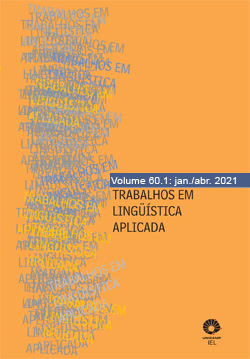Abstract
This article aims to discuss the expression ‘dispute the nega’ - which is part of the cultural universe of many regions of Brazil and constitutes social practices in contexts of competition in different games - from the perspective of studies of gender, discourse, race and social class. For this purpose, we theoretically focus on authors who problematize gender relations in an intersectional perspective, highlighting other dimensions that permeate this category, such as race, class, sexuality, ethnicity, etc. The studies of Angela Davis (2016) and Heleieth Saffioti (2013) on gender, race and class, and Norman Fairclough's (1998; 2001; 2003) works on discourse, among others, are brought to the theoretical scene. We intend, with this, using as a tool of analysis the principles of Critical Discourse Analysis - ADC (FAIRCLOUGH, 2001, 2003; VIEIRA; RESENDE, 2016; MAGALHÃES, 2000), to unveil the ideological discourses that underlie the expression ‘dispute the nega’, as well as understand its cultural and historical roots, once the person who is the object of the dispute is a black woman whose body is offered as a prize to the winner, thus being objectified, subordinated and instrumentalized, following the logic of a patriarchal society in which the woman's body, and the black woman’s in particular, is used primarily and essentially to serve men in their physical and emotional needs. In this study, we are guided by the butlerian conception of gender, as we agree that the constitution of this category occurs through cultural and social confrontations reiterated daily by discursive practices. In other words, it is about the preponderance of the discourse in the constitution of the subjects, given that we are constituted from the other. When proposing the study of expression in emphasis in the perspective of intersectional analysis (SCOTT, 1994; BUTLER, 2016; DAVIS, 2016) we realize that the intersectionality of gender permeated by other social markers puts on evidence female subordination, since the category woman, especially the black and poor, remains, even today, in a condition of objectification, marginalization and subordination in society.
References
BASTIDE, Roger; FERNANDES, Florestan. Brancos e negros em São Paulo. São Paulo: Companhia Editora Nacional, 1959.
BERNARDINO-COSTA, Joaze; GROSFOGUEL, Ramón. Decolonialidade e perspectiva negra. Revista Sociedade e Estado, Vol. 31, N. 1, p. 15-24, Janeiro/Abril 2016.
BUTLER, Judith. Fundamentos contingentes: o feminismo e a questão do ‘pós-modernismo’. Cadernos Pagu, n. 11, p. 11-42, 1998.
BUTLER, Judith. Problemas de gênero: feminismo e subversão da identidade. Tradução de Renato Aguiar. Rio de Janeiro: Editora Civilização Brasileira, 2016.
CARNEIRO, Sueli. Gênero, raça e ascensão social. Revista Estudos Feministas, v. 3, n. 2, p. 544-552, 2. sem. 1995.
CARNEIRO, Sueli. Mulheres em movimento. Estudos avançados, 17 (49), 2003.
CURIEL, Ochy. Identidades esencialistas o construcción de identidades políticas: El dilema de las feministas afrodescendientes. Revista electrónica Construyendo Nuestra Iterculturalidad, ano 5, v.4, n.5, 2009.
DAVIS, Angela. Mulheres, raça e classe. Tradução de Heci Regina Candiani. São Paulo: Boitempo, 2016.
DORLIN, Elsa. Sexe, race, classe, pour une épistémologie de La dommination. Paris: PUF, 2009.
FAIRCLOUGH, Norman. Language and Power. New York: Longman, 1989.
FAIRCLOUGH, Norman. Discurso e mudança social. Tradução de Izabel Magalhães. Brasília: UNB, 2001 [1992].
FAIRCLOUGH, Norman. Analysing discourse. Textual analysis for social research. London: Routledge, 2003.
FANON, Frantz. Pele negra, máscaras brancas. Tradução de Renato da Silveira. Salvador: EDUFBA, 2008.
FREITAS, Lúcia; PINHEIRO, Veralúcia. Violência de gênero, linguagem e direito – análise de discurso na Lei Maria da Penha. Jundiaí-SP: Paco Editorial: 2013.
GOMES, Nilma Lino. O movimento negro educador – saberes construídos nas lutas por emancipação. Petrópolis, RJ: Vozes, 2017.
GONZALES, Lélia. Racismo e sexismo na cultura brasileira. In: Revista Ciências Sociais Hoje, Anpocs, 1984, p. 223-244.
GOUVEIA, Carlos. Análise crítica do discurso: enquadramento histórico. In: PEDRO, E. R. (Org.). Análise crítica do discurso: uma perspectiva sociopolítica e funcional. Lisboa: Editorial Caminho, 1997. p.339-356.
HOOKS, bell. Intelectuais negras. Estudos Feministas, v. 3, n. 2, p. 464-469, 1995.
LEITÃO, Eliane Vasconcellos. A mulher na língua do povo. Belo Horizonte: Itatiaia, 1988.
LIMA, Maria Cecília de. Discursos sobre gênero e identidade. In: OTTONI, M. A. R,; LIMA, M. C. de (Org.). Discursos, identidades e letramentos – abordagens da Análise de Discurso Crítica. São Paulo: Cortez, 2014.
LOURO, Guacira Lopes. Gênero, sexualidade e educação – uma perspectiva pós-estruturalista. Petrópolis: Vozes, 2014.
MAGALHÃES, Izabel. Eu e tu: a construção do sujeito no discurso médico. Brasília: Thesaurus, 2000.
MEYER, Dagmar Estermann. Gênero e educação: teoria e política. In: LOURO, G. L.; FELIPE, J.; GOELLNER, S. V. (organizadoras). Corpo, gênero e sexualidade: um debate contemporâneo na educação. 9. ed. Petrópolis, RJ: Vozes, 2013.
OTTONI, Maria Aparecida Resende. As representações identitárias de gênero no humor sexista. In: OTTONI, M. A. R,; LIMA, M. C. de (Org.). Discursos, identidades e letramentos – abordagens da Análise de Discurso Crítica. São Paulo: Cortez, 2014.
SAFFIOTI, Heleieth. A mulher na sociedade de classes: mito e realidade. São Paulo: Expressão popular, 2013.
SCOTT, Joan. Gênero: uma categoria útil de análise histórica. Educação e Realidade, Porto Alegre, v. 16, n. 2, p. 5-22, 1990.
SCOTT, Joan. Prefácio a gender and politics of history. Cadernos Pagu, n. 3 (Desacordos, desamores e diferenças), p. 11-27, 1994.
SCOTT, Joan. La citoyenne paradoxale: lês féministes françaises et lês droits de l’homme. Paris: Albin Michel, 1998.
THOMPSON, John Brookshire. Ideologia e cultura moderna: teoria social crítica na era dos meios de comunicação de massa. Trad. (Coord.) Pedrinho A. Guareschi. Petrópolis: Vozes, 2002.
VAN DIJK, Teun. A. Discurso e Poder. São Paulo: Contexto, 2015.
VIEIRA, Viviane; RESENDE, Viviane de Melo. Análise de Discurso (para a) Crítica: O texto como material de pesquisa. 2.ed. Campinas, SP: Pontes Editores, 2016.

This work is licensed under a Creative Commons Attribution 4.0 International License.
Copyright (c) 2021 Trabalhos em Linguística Aplicada


